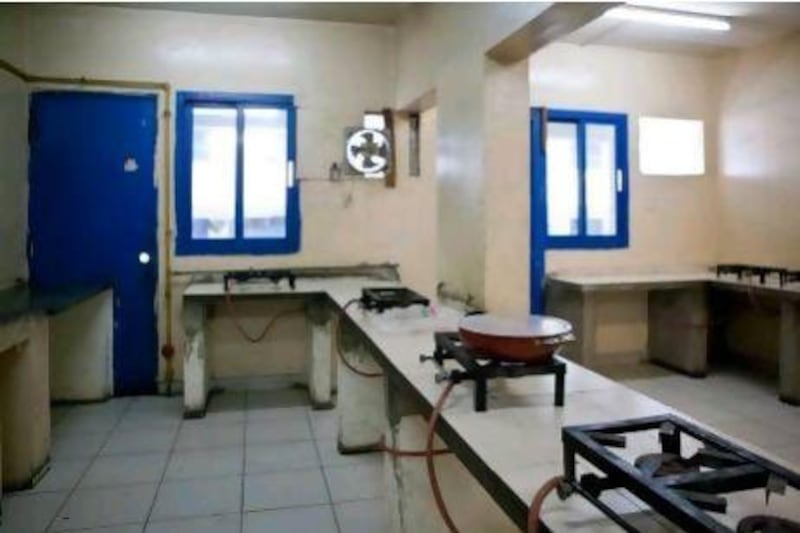DUBAI // Cockroaches scuttle from the corner of the kitchen on to the cooking table.
Next to the table, a concrete chopping board is covered with dirt-filled cuts. The once-white walls are yellow and grimy.
Hundreds of flies circle the kitchen while a worker prepares his fish on a table scattered with food crumbs that are mixed with insects.
Small holes in the corners of the black, sticky floors shelter thousands of cockroach eggs, while rusty metal kitchen utensils are placed on a window to dry off in the heat.
This is the kitchen of a labour camp in the Jebel Ali Industrial Area 2, one of six where about 600 Indian, Bangladeshi, Pakistani and Sri Lankan workers prepare their meals each day.
A food expert says it bursts with health hazards that are more than likely to lead to regular bouts of food poisoning.
"It's a total disaster," says Sven Mostegl, a food consultant and chief executive for the catering company Professional Food Solutions in Jebel Ali, as he lifts the lid of a cooking pot. "It's so dirty and there are no dustbins."
When the food is brought into the kitchen it is placed on a marble table, explains Murshet, 24, a labourer from Bangladesh.
That means raw and cooked food are mixed, "the cause of major food-poisoning cases", says Mr Mostegl.
Each kitchen has 15 mobile gas stoves, five drinking-water taps and four for cooking and washing water.
"There is no water filter or water meter here," notes Mr Mostegl. "There is no hand disinfectant and the sinks used to clean the plates are full of leftover food dumped by labourers."
Although a no-smoking sign and fire extinguisher hang on the walls, the floors are filthy and home to cockroaches that are up to four centimetres long.
In another kitchen, rice has been dumped in a drain. "This can lead to rats and pests," Mr Mostegl says. "There is zero hygiene here."
All windows and balcony doors are open "for ventilation purposes", says Sataya, 35, an Indian labourer.
Mr Mostegl says this poses even more problems.
"You can imagine what the air feels like in the kitchen in summer, with a 45°C temperature," he says.
"Between Dubai's humidity and the hot weather, it's a party for bacteria. Cockroaches have access to food on the ground, water and the perfect hot temperature. Now, bacteria, virus and fungus can grow at great speed."
Two wires protrude from the floor next to a water pipe. "It's for the water dispenser," says Murshet.
They are more suited to accidentally electrocuting the workers, counters Mr Mostegl.
"It's shocking," he says. "There is no soap, no chiller, no freezer in the kitchen or in the dining hall, so they must keep their food in the room."
The dormitories each house four workers and a small fridge.
"They can barely store food before and after cooking, which explains why they have so much food poisoning," Mr Mostegl says.
For many labourers, hygiene concerns come a distant second to cost.
"We like it here because the price is cheap, around Dh1,100 for four people," says Sataya, who has lived in the camp for two years.
Mr Mostegl says the law forbids workers from eating in bedrooms.
"You need a kitchen and a dining room on every floor," he says. But this camp only has one poorly kept dining room on the ground floor.
"There are no fly-killer instruments, no air conditioning, no ventilation, no hand wash, no hand disinfectant or garbage bag."
Sataya is aware of the law about eating in dormitories, but says: "A lot of people do it because we don't have much choice."






